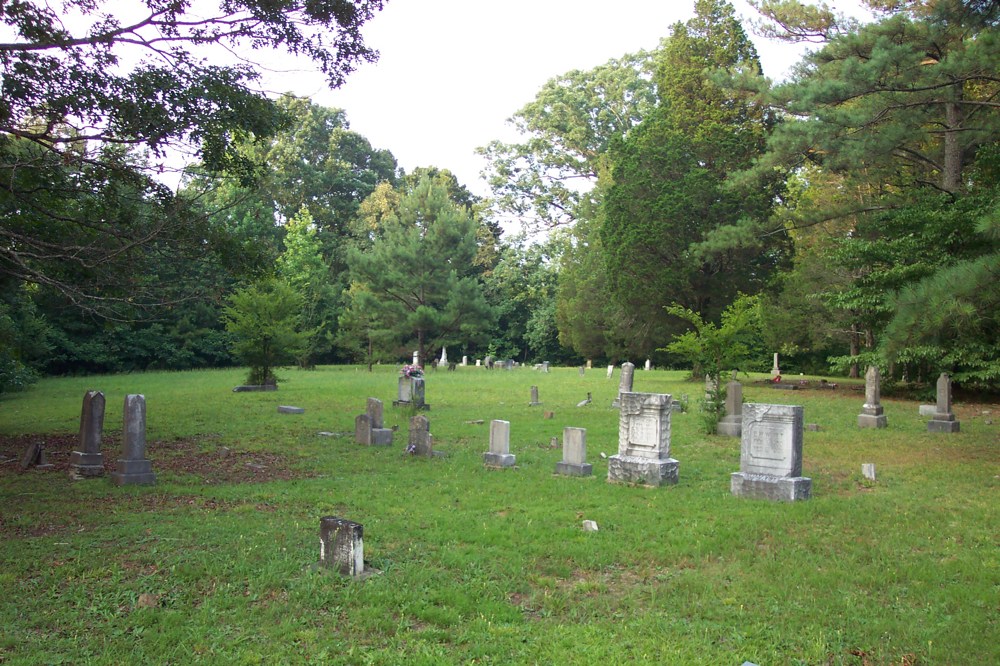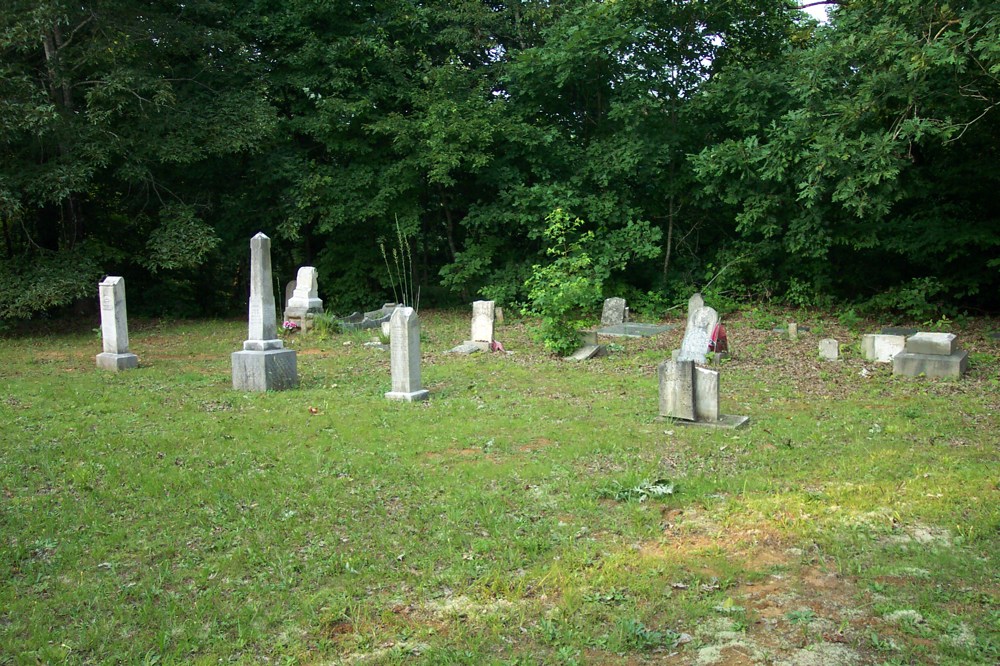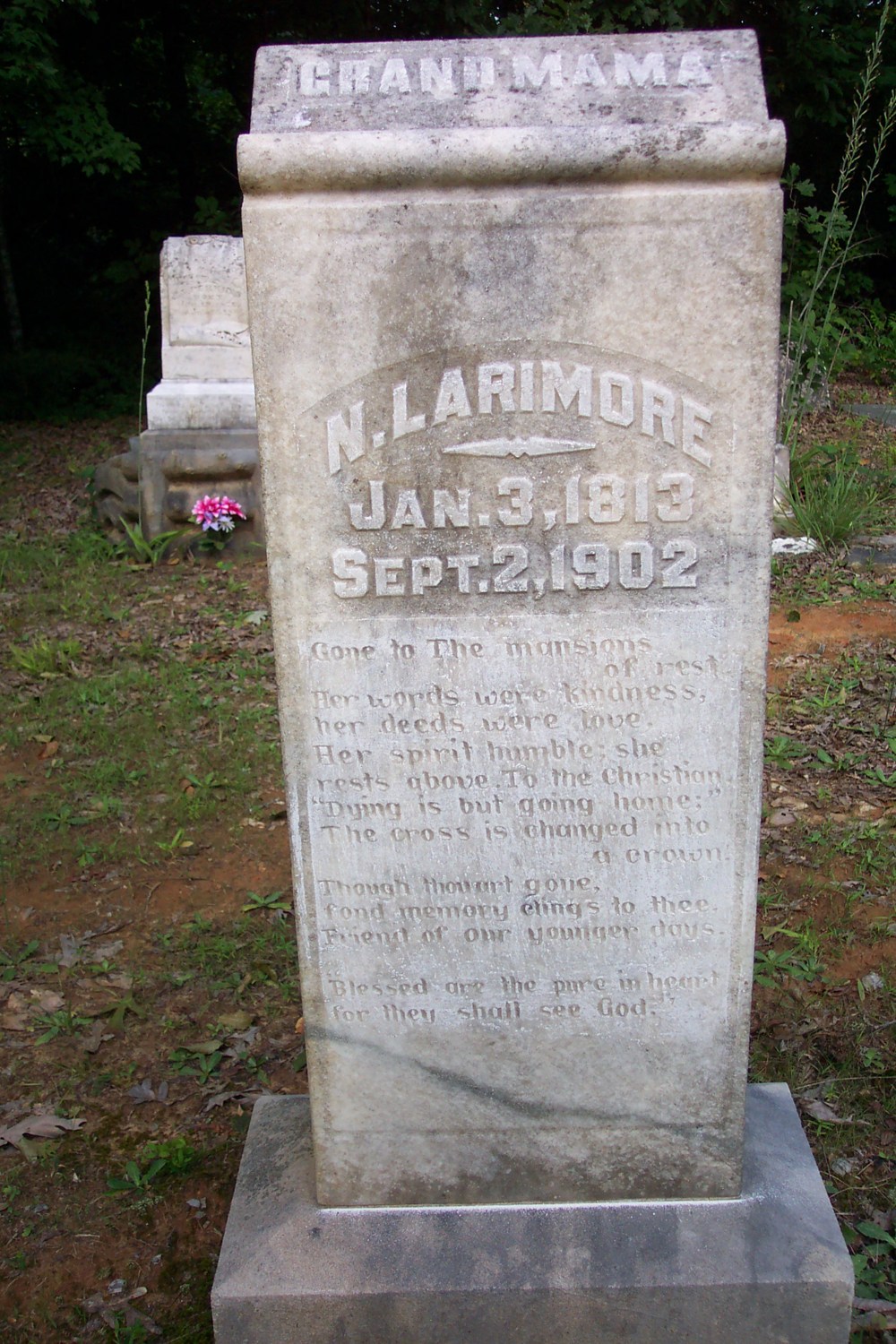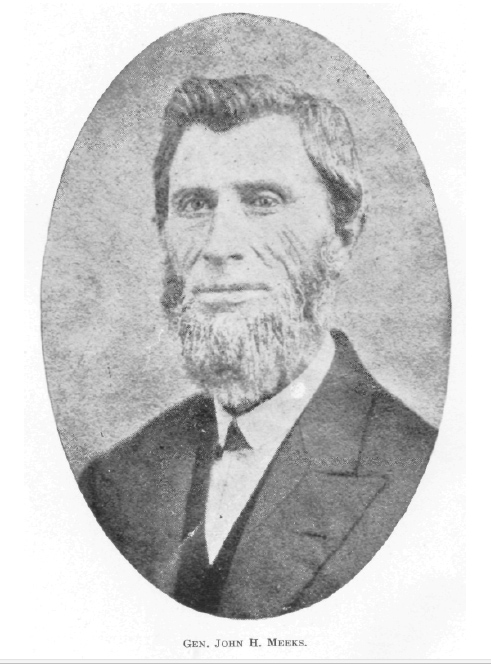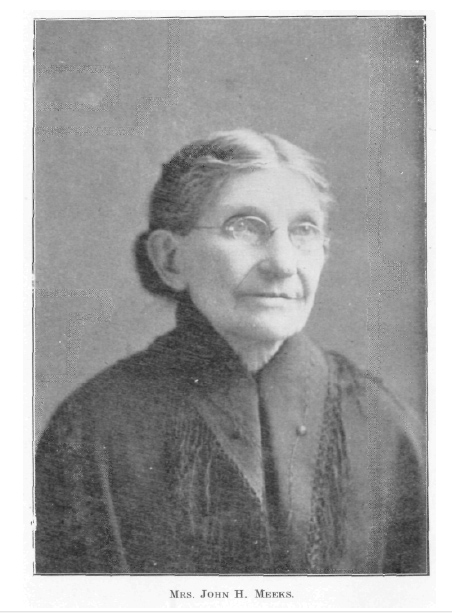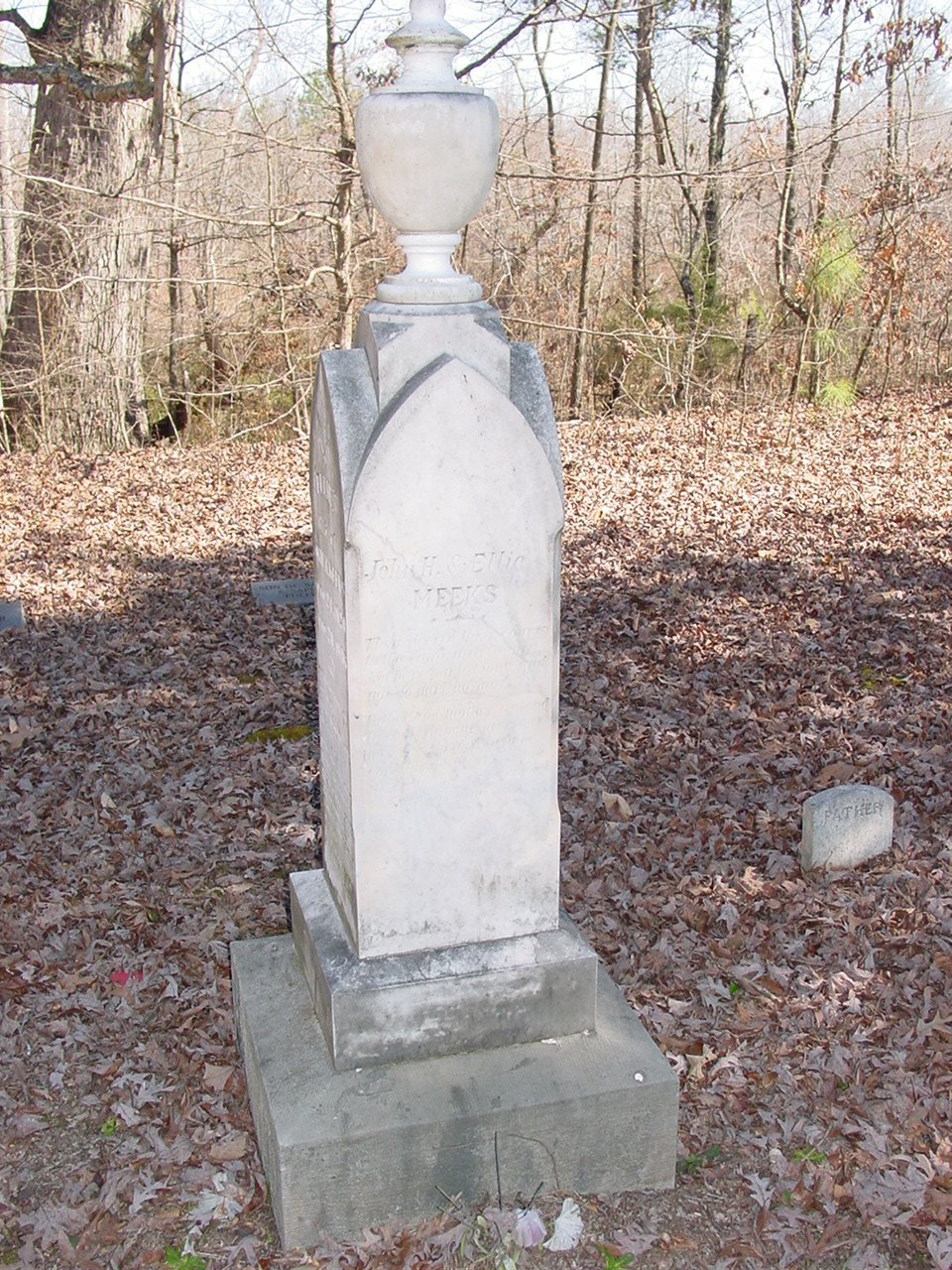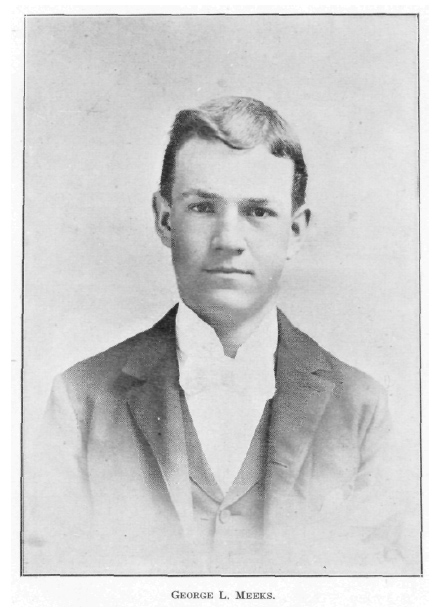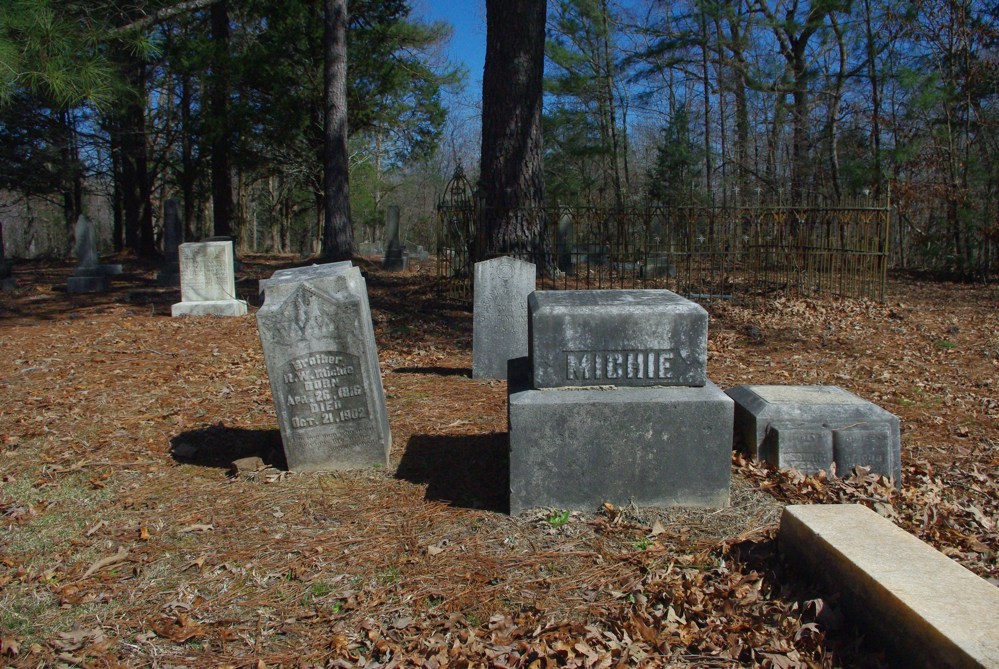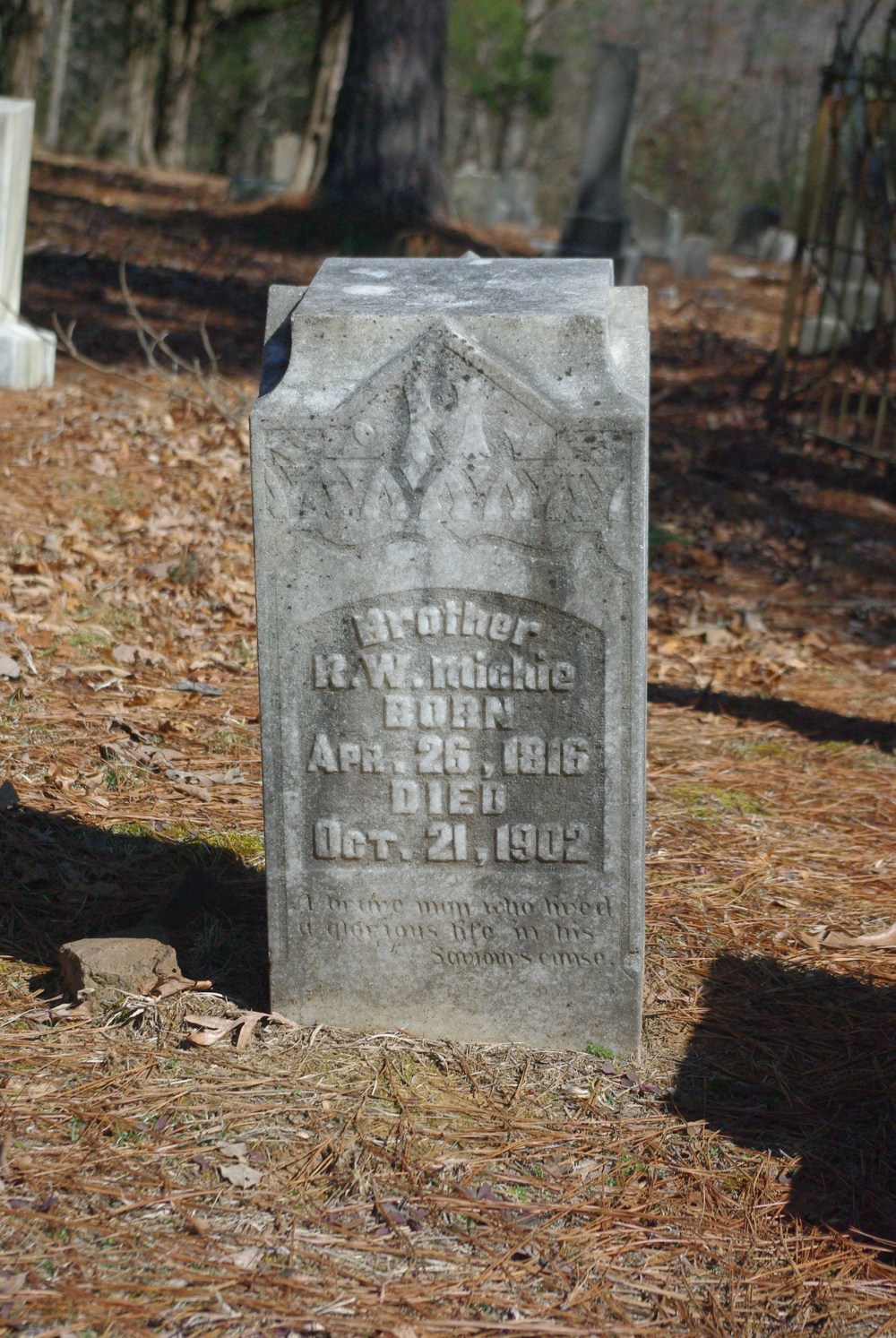Clear Creek Church of Christ And Cemetery
Stantonville, Tennessee from 1841
![]()
Table Of Contents
Photos of Clear Creek Meetinghouses
History of Clear Creek Church of Christ
Clear Creek Cemetery
Nancy Larimore
General John H. Meeks
George L. Meeks
R.W. Michie
Jane Usserry
Directions To Clear Creek
Acknowledgements

Earliest Church building and members - 1850s

Second Building Into The 1950s
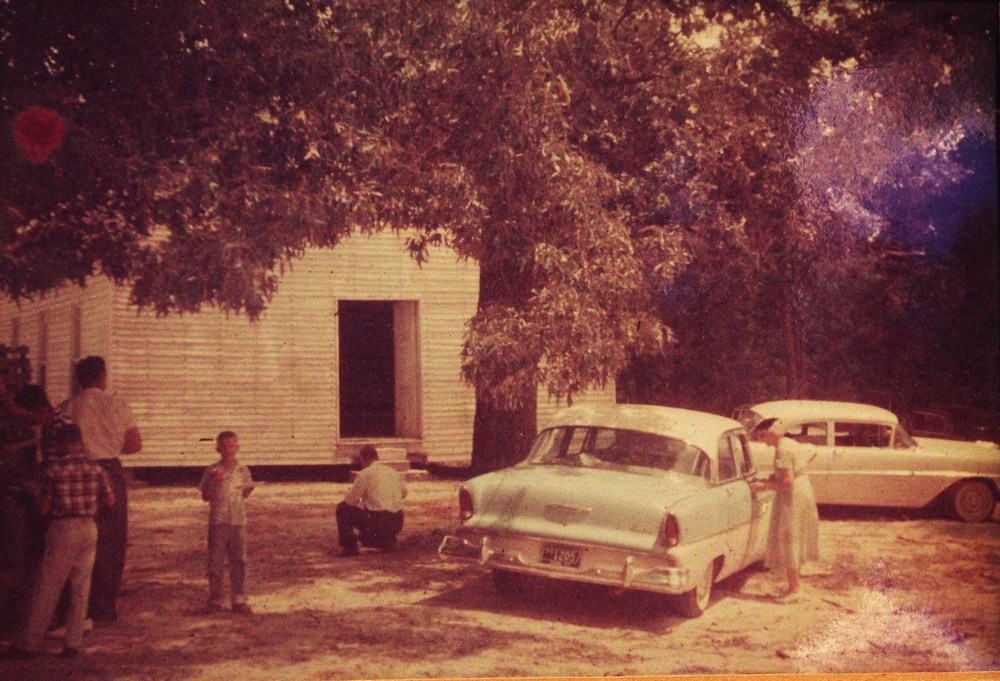
Courtesy of C. Wayne Kilpatrick, March, 2014
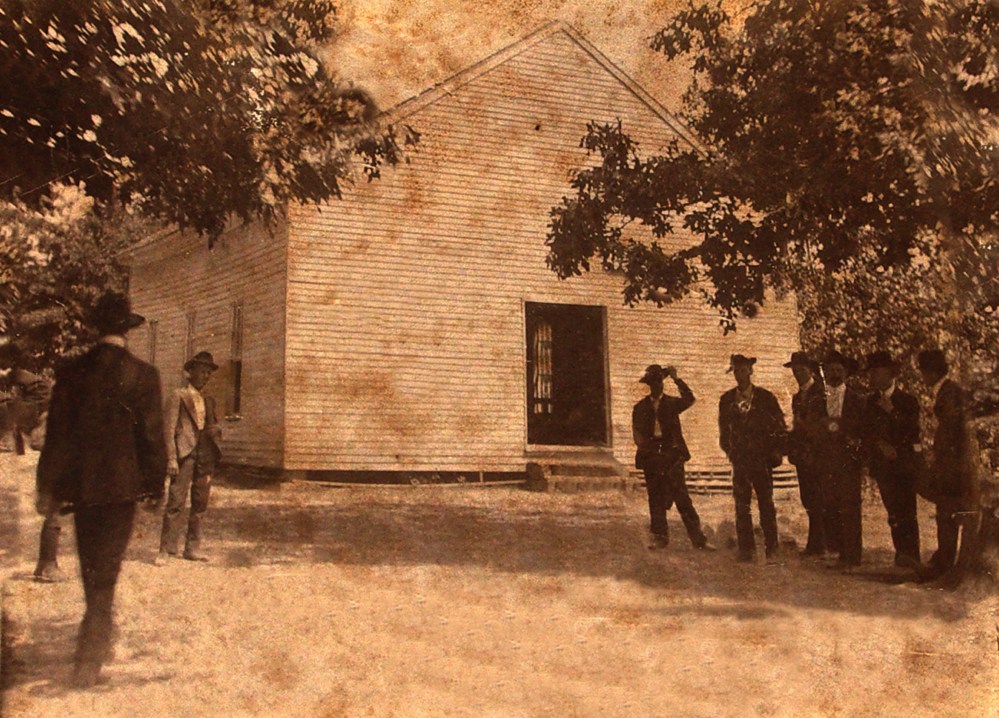
Courtesy of C. Wayne Kilpatrick, March, 2014
The History Of The Clear Creek Church of Christ
Clear Creek Cemetery
Nancy Larimore
1813-1902
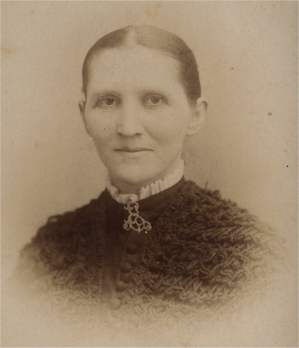
George K. (c. 1794-) and Mary (c. 1792-1877) LARIMORE were the grandparents of famed Christian Church/Church of Christ evangelist Theophilus Brown (T.B.) LARIMORE (1843-1929). This communion of churches, founded by Thomas and Alexander Campbell and Barton Warren Stone as a Christian movement dedicated to Christian unity and church reform, officially split in 1906 into the Christian Church and the Church of Christ. To his credit, Elder LARIMORE refused to take sides in the split, remaining in fellowship with both groups.
T.B.'s mother's name was Nancy LARIMORE(c. 1813-1902). NANCY was the dau. of George K. and Mary LARIMORE. T. B. LARIMORE'S birth father is unknown. Christian Church/Church of Christ evangelist FD SRYGLEY, in his 1889 biography of LARIMORE, "Smiles and Tears: Larimore and His Boys," says only that LARIMORE was born into a prosperous family that was ruined financially and the father subsequently became an alcoholic and eventually left them. From T. B.'s having the surname LARIMORE and the fact that no marriage has been located for his mother it seems that Elder LARIMORE was an illegitimate child. Elder LARIMORE stated that his mother named him Theophilus Brown because she liked the way it sounded and because they were relatives of the Brown family of Tennesse that produced several governors of that state. This connection has not been authenticated as of yet.
Nancy LARIMORE had four children, two sons and two daughters. T. B.; PORENDS, or PORENDO, (1847-), who died or went missing during the Civil War; MARY F., "MOLLIE" (c. 1852-aft 1920), who married Christian Church evangelist Rufus Polk MEEKS; and HELEN (c. 1838-), who married Joseph TATE (c. 1838-) in 1859 in Sequatchie County, TN. JOE and HELEN had one child, a dau. CAPITOLA, born 1859/1860. What became of PORENDS, HELEN, JOE and CAPITOLA isn't known.
NANCY was living with her mother MARY in Sequatchie Co, TN in 1870. By 1880 she was living with dau. MOLLIE and son-in-law RUFUS until her death in 1902. Son T.B. graduated from Mossy Creek Baptist College (now Carson Newman, before he and his mother and sister joined the Christian Church. T. B. became a preacher, and in 1871 opened Mars Hill Academy for Males and Females near Florence, AL, operating the school until 1887, at which time he closed it to preach full time.
T.B.'s first wife was Julia Esther GRESHAM (1843-1907), one of several children of Philemon and Delilah FILES GRESHAM of Lauderdale County. ESTHER gave him several children; his second wife was Emma PAGE (c. 1854-1943). Because of his refusal to draw lines over the doctrinal disputes of the day and his love for all men, T. B. LARIMORE was one of the most noted and beloved evangelists among Christian Churches/Churches of Christ after the Civil War. His Mars Hill Academy trained dozens of young preachers for the ministry.
George K. and Mary LARIMORE had at least three children that I can document, perhaps four: James H. LARIMORE (c. 1836-), who married Mary BREWER in Sequatchie County, TN in 1853. They had at least one child, a son named WILLIAM, born c. 1854. And a JH LARIMORE served in Co G, 51st TN Inf.; Jackson V. LARIMORE (c. 1838-), who served in Co F, 2nd TN Cav. In the 1860 Sequatchie census enumeration for the household of William DAVIS, there's a Julia A. LARIMORE (c. 1843-), who married Wm. Emery HATFIELD in Sequatchie in 1863 and drew a widow's pension. If memory serves this JULIA was TB LARIMORE'S cousin.
George K. LARIMORE is buried on Cagle Mountain, near Dunlap, in Sequatchie County, TN. MARY is buried in nearby Williams Cemetery. Nancy LARIMORE is buried near Stantonville, TN, close to the historic Shiloh Battlefield.
I'm a historian interested in T. B. LARIMORE not a LARIMORE descendent. I have documentation for all of the information posted above and I'd love to swap information with any LARIMORE descendents (esp. Lynda WILSON above) who can fill in the gaps on LARIMORE'S parents' families.
Lee Freeman, lfreeman_histgen@hotmail.com
Source: Geneology.com link
Follow-up to the above post.
George K. LARIMORE was enumerated in Jefferson Co., TN in 1830. His name appears in a tax list of Jefferson Co. in 1822. In 1850 GEORGE, and MARY were living in Bradley Co., TN with their sons JAMES H. and JACKSON V. By 1860 they're in Sequatchie Co., with the two sons and their dau. NANCY and her family. Nancy LARIMORE'S son, T. B. Larimore, was born in Jefferson Co., and raised near Dunlap, in Sequathcie Co. Lee.
Source: Geneology.com link
![]()
"GRANDMAMMA."
"HOME, sweet home"—a household of peace, crowned with Christian love and unity—is made sweeter still by the presence of an honored, well-balanced, hoary head which "Time has touched in his rapid flight, And changed the darker locks to white." Time has thus dealt with a dear old fireside jewel of our little household, and now she is lovingly called "grandmamma." We often speak of the milestones along life's road. This is very appropriate until we cross the half-century mark, after which some one says anniversaries come "like telegraph poles when we are on a lightning express train." Doubtless they seem to pass incredibly fast to this aged pilgrim, who still adds so much cheer to our little home circle and for whose prolonged existence we are truly grateful. Among the first things I remember about her is when good old Brother Love—one of the Lord's best watchmen of souls—gently led her down into the waters of baptism. I wondered why he did this, for I was then too young to realize the importance of obeying even a command of God for which we could see no necessity. It does not seem long since that day, but time has passed with winged feet and has buried more than two-score years in the grave of the yesterdays. Years seem long or short according to their goal, and her aim has been to honor the divine name she that day assumed, try to advance the Master's cause she that day espoused, and lighten the burdens of frail humanity. During this long journey, since she entered the ranks of the world's great Leader, not one backward step have we known her to take.
"That load becomes light which is cheerfully borne." The spirit wrapped in this little borrowed thought has greatly aided her in enduring life's trials, of which she has had her share. Realizing a busy hour seems shorter than a leisure one, she, with heart full of unshed tears, has many times put on a bright countenance and looked around her for some one she could benefit; and in benefiting others, she has herself been blessed. The bitter of life's cup she has sipped with meek submission, though many times with breaking heart; of the sweet she has participated with humble gratitude. While blessed with physical strength, to the distressed she was always a "good Samaritan;" to the needy, a ready friend. She never impairs the happiness of others by frequent allusions to her own ailments, misfortunes, and sorrows. She has always manifested a devotion for her friends and loved ones which is really charming, forgetting herself in their behalf, no sacrifice being too great for her to make for them. She possesses a sweet, amiable, cheery disposition which few can claim in so high a degree. Her mind has been so wholesomely and actively' employed it has been less susceptible of the decrepitude that usually attends the aged than a mind that "feeds on itself." It is remarkable to see one at the advanced age of eighty-nine so well preserved and so free from being childish and sensitive. So many in their declining years lose interest in the activities of the present and live only in the memories of the long ago. Not thus with her. In memory her strong mind can look back and view the scenes and incidents of more than three-fourths of a century, and she can thrill the youth to-day with verbal descriptions of the same. At the same time, with her active brain and well-preserved visage she keeps informed as to the occurrences of the present, and is interested in the world's daily happenings. She finds great solace in good books, and reads until her eyes falter over the printed page; then stops a while, walks around, works with her flowers, looks admiringly on the beauties and grandeur of earth and sky; then comes back, and is soon busy again with her work or reading. Her industrious habits are proverbial. Reared under the "old constitution," she is, in one respect at least, far from being up To date, and may by some be regarded as "old fogy"—that is, when in reasonable health she never lies down during the day; cannot be persuaded to do so.
"Grandmamma Larimore" has many friends among young and old, won by her mild, lovable disposition. She is so grateful for every little service rendered her, and never forgets the golden key: "Thank you." When suffering, she tries to keep any one from knowing it. She has kept folded from us hundreds of ills which we would by chance at last discover. Then she would mildly say: "Well, what good would it do to tell you of every little ache and pain?" I often wish she would complain more when suffering, so I would not neglect her and could give her at least a little more sympathy. (She is averse to medical treatment.) It is said that suffering becomes beautiful when borne with cheerfulness through greatness of mind. She often locks her sorrow in her own bosom and keeps her aches to herself, that others may not be grieved thereby.
Though this dear old "grandmamma" (my own tender mother) may live years after seeing me buried, yet I realize too sadly that, according to nature, she is rapidly going down the hill of life—nay, rather, that in the sublimest sense she is fast going up; is climbing higher and higher; has already climbed so high she can plainly see, through the telescope of faith, into the city of gold and pearls. She is nearing the last round of life, from which she can step into the portals of glory. When I think of this (which is often), I am haunted with such questions as these: Am I doing what I can for her? Am I making her life as bright as I could? She freely gave much of her time and strength for my benefit when time and strength were hers to give. Am I doing as much for her? Through winter's blast and summer's scorching heat she has toiled for me, and has willingly and gladly sacrificed much for my sake. She watched my infant slumbers with an anxiety that none but a mother can feel. With her soft, velvety hand she has lovingly bathed my fevered cheek and pressed my aching brow. Have I repaid her? Nay, verily. She is now where, if I am spared, the wheels of time will soon place me. It is mine now to bear her burdens and to shield her as she long ago shielded me. Am I doing thus? (I hope the public will forgive me for what I am saying.) She is doubly dear to me; is so much comfort and ever ready and anxious to do all in her power to add to my pleasure; is such good company, so companionable, so sweet; but do I tell her so as often as I should? That great heart of love which glowed with devotion for her children in their babyhood has never grown weary in its devotion; but as the sunflower continually turns to face the "day god" as he traces his course across the skies, so she ever turns her fond vigils on us as we travel the dusty road of life, and is ever ready to weep at our failures or rejoice at our success. If I love and appreciate her, shall I wait until she is gone before I tell her so?
I trust no one will censure me for saying that to me it gives a sense of rest to look upon that open countenance—so earnest, tender, strong, and true. To me there is an inward beauty shining through "the chinks that time has made," illuminating the face with a soft, mild splendor, giving sweetness to the expression and charm to every word and look. I can imagine those wrinkles as only bright wavelets of sunshine chasing each other over the dear old face; I can see true, pure mother love peeping out from the shallow furrows which time has plowed in her cheeks; but shall I wait until the death angel calls her and is closing the gate of day before I tell her how I love and appreciate her? Shall we all wait until she is gone, then speak her praises only on paper and marble?
I feel so thankful that, though seemingly she is perfectly resigned and ever ready for the summons to go hence, she does not, like some, appear to grow weary of this life, become homesick, and pine and sigh for home. It is my hope that, with her wonderful constitution and vitality, braced by her patience, prudence, and sound judgment, we may for several years yet be blessed with her presence to cheer our homes and hearts. May such our fortune be; then "when in the bosom of the west the weary sun sinks to his rest," may she only wrap the mantle of faith more closely around, her and lie down to peaceful dreams, to awake in the happy beyond.
-Mollie Larimore Meeks, Hearthstone Echoes, page 384-389
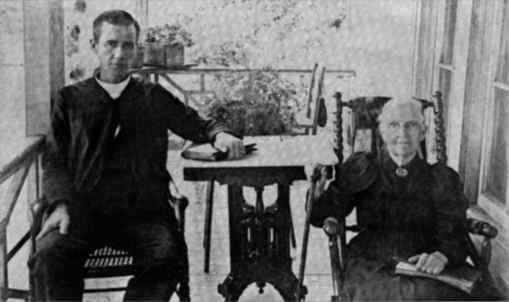
T.B. And His Beloved Mother, Nancy Larimore At Mars Hill
![]()
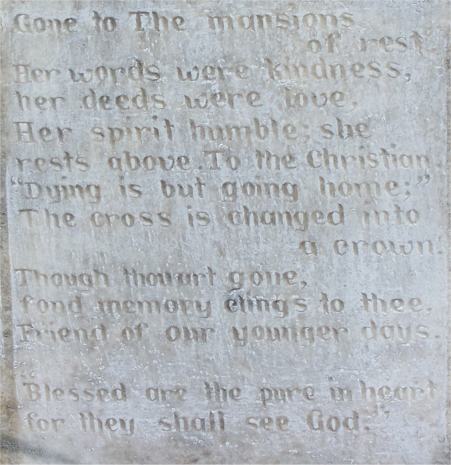
Aunt Nancy Larimore
(Mother Of T.B. Larimore & Mollie Meeks)
On Stone:
GRANDMAMA
N.Larimore
January 3, 1813
September 2, 1903
Gone To The Mansions Of Rest,
Her Words Were Kindness,
Her Deeds Were Love,
Her Spirit Humble,
She Rests Above To The Christian
"Dying Is But Going Home"
The Cross Is Changed Into A Crown
Though Thou Art Gone
Fond Memory Clings To Thee
Friend Of Our Younger Days.
'Blessed Are The Pure In Heart
For They Shall See God.'
General John H. Meeks
1814-1898
"I love to tell the story
Of Jesus and his love,"
and exhort sons and daughters of men to become son3 and daughters of the Lord Almighty, and live as Jesus lived; but it is so easy for those who are not willing to walk in his footsteps to say, "He was divine; we are human. Divinity can never do wrong. It is as human to err as it is divine to forgive. We should not be expected to be pure and gentle, longsuffering, merciful, forgiving, sympathetic, loving and kind, as was He." Moreover, those who talk thus are almost sure to act accordingly.
"I love to tell the story "
of prophets of God and apostles of the Lamb, to encourage men and women, boys and girls, to be "faithful unto death," even as were they; but, then, the heart and life, if not the lip, so often reply, "They were inspired; we are not. So much should never be expected of us. We are prone to err." Then, such souls continue to practice what they preach, thus proving that they are, indeed, decidedly "prone to err." These things being true,
"I love to tell the story"
of faithful men and women, boys and girls, of our own land and age, whose hearts are pure, records clean, and lives sublime. Such was the heart, the record, the life of the hero of this sketch—a modest man of almost PEERLESS purity.
That
"Lives of great men all remind us
We may make our lives sublime,"
is true; and it is as clearly and as certainly true that genuine GOODNESS is an essential element of TRUE GREATNESS; hence the value of such a life as our beloved brother lived, and, consequently, of such a sketch as this one ought to be, time can never tell—eternity, alone, can reveal. John Henderson Meeks, son of John and Martha Meeks. was born in Lincoln County, Tenn., September 27, 1814. He never knew a mother's love, his mother having died when he was only fourteen days old. He grew from babyhood to manhood in the household of his grandfather, Capt. John Henderson, of Revolutionary fame. He lived in Lawrence County, Ala., eleven years—from 1819 till 1830 —at the close of which period, McNairy County, Tenn., became his home; and there he lived—a light in the land—all the remnant of his days.
Such was his grandfather's confidence in him, that, leaving a large estate, he made him the executor of his will, notwithstanding he had honorable, trustworthy sons much older than the grandson. The youthful executor "wound up" the estate so as to give perfect satisfaction to all concerned —a feat but seldom successfully performed, it is said. Such was the confidence justly reposed in him, that, from that day till the day of his death, he nearly always had that kind of work on hand; and it is not known that he eve? failed to give perfect satisfaction. Notwithstanding such work naturally and necessarily caused him to have much to do with law, lawyers and litigation, he never sued or was sued on his own account—NEVER. A true, sympathetic and faithful friend, philanthropist and benefactor, those who knew him respected, loved and honored him—those who knew him best respecting, loving and honoring him most. He always promptly paid his own debts, and few ever failed to promptly pay him. He sincerely sympathized with suffering humanity, especially the poor. He never had a neighbor who was too poor to borrow money from him, if he seriously needed it. He had confidence in his fellowman, and that confidence was rarely betrayed or abused. Trusting God, he trusted man, and rarely had cause to regret it.
On January 27, 1841, he was married to Miss Eleanor Atkins, of McNairy County, Tenn. They lived together happily fifty-five years. She was a woman eminently worthy, in every sense, to be the wife of even such a man as he. To them were born five sons and three daughters—_ all worthy of the parents whom they loved, honored and obeyed. On June 20, 1896, Sister Meeks went away from home and loved ones here, leaving behind her a record free from blot or blur or blemish. From that dark day, our bereaved brother, sad and lonely, though his children did all that affectionate children could do, to make him happy, seemed to be "waiting and watching" for her return; and, in the delirium of death, he repeatedly said, "I 'm going to meet her; I 'm going to meet her."
With never a preference for politics, and never a professional politician, but ever a faithful friend and pure patriot, he was constrained by hosts of friends to spend much of his life in the public service of his country. This he did, however, simply as a service of duty, in obedience to his country's call. He never sought office, but office often sought him. Being a signally successful farmer, da voted to home and loved ones, he greatly preferred the quietude of private, country life; but, between the years 1847 and 1855, he represented his county in the State Legislature twice, being the first Democrat who ever "carried" the county. The Whig majority was overwhelming when he consented to "enter the race"; but friends, forgetting politics and parties, voted for the man, and triumphantly elected him. Having completed his second term in the Legislature, he was. nominated for the Senate, but declined to "run," and, like Cincinnatus of old, gladly turned from politics to the plow, having, like that marvelous old Roman, served his country in a public capacity till he believed his services were no longer necessary. He subsequently attended a political convention, to nominate his friend, John V. Wright, for Congress. To his astonishment—for he was too modest to ever be conscious of his own greatness, influence, popularity or power—the nomination, which meant election, was enthusiastically tendered to him. Accept it? NEVER. He promptly, positively and persistently refused to accept it; having gone there pledged to another, and being too sublime a character to betray a trust or supplant a friend. It is thought, however, that possibly there may be a few men—politicians and preachers, probably—now living who, under similar circumstances, might be prevailed upon, by the powerful pressure of persistent persuasion, etc.—especially the etc.—to go to Congress and stay there; but General Meeks never belonged to that class. He was a man.
In 1870, leading lights and legal lore of Tennessee were called together in Nashville as a "Constitutional Convention," to make a Constitution for the Volunteer State. His home was my home then; and I am sure he never entertained the thought of ever entering the sphere of public life again. He had voluntarily retired from political life, and resolved to return to it no more. His word, not to mention other proofs, was proof enough of that. The importance of the work was such, however, that friends who loved their country said he must represent them and serve his State in that important crisis—a crisis that called for the wisest and best to succor and serve the State. Being pressed by their importunities, and convinced that duty demanded the sacrifice, he reluctantly and regretfully consented; but said, "This must and shall close my public career forever. I'll serve you this time; but never again—politically." That settled that—settled it forever—and those who knew him knew it; hence when he had served them and his county wisely and well, as an honored member of the "Constitutional Convention," helping to give his native State a good Constitution, it was tacitly understood that he was to be allowed to rest till God should call him home. Thus closed the public career of one political character whose life was so pure and record so clean that nothing of a disreputable, or even questionable, character was ever charged against him. None dared to slander him. When about twenty-seven years of his life—nearly one-third of it—had come and gone, he heard the gospel preached, in its primitive purity and sweet, sublime simplicity, and understood it perfectly. As he had, even then, for twenty years, longed to be a Christian, he was "almost persuaded" to obey the gospel then and there; but the contrast between it and what he had been hearing all his life, as a substitute for the gospel, was so striking as to shock and bewilder him; and, as he often testified, this and the confusion, division and strife among those claiming to be "born of the Spirit" and—some of them—"called of God to preach the gospel," kept him out of Christ till five and twenty years more had passed away forever.
In 1866, the earnest, plain preaching and powerful pleading of R. W. Michie, one of the purest and best of preachers, prevailed upon him to render the obedience he had so long postponed. Being then and thus and there "born again."—born into the church (family) of God—he thenceforth, as long as he lived in this world, was a consistent Christian, a great power for good, and, for thirty years, a respected and revered elder of the Church of Christ at Clear Creek, McNairy Co., Tenn.—one of the best and strongest churches in all this goodly land that we, with pleasure—not, of course, with pride—call our country.
He was no exception to the rule, "Man is born unto trouble as the sparks fly upward"—a truly thrilling thought, that should make all thoughtful people "wondrous kind"; as, indeed, all true and faithful Christians are. Storms of sorrow sometimes swept down upon his tender heart and sympathetic soul. In the days of his childhood, he often wept because he had no mother. Seeing mothers caressing their children, and realizing that there is no other love like a mother's love, he wept, as if his heart would "break, because he had no mother. This may be one reason why, even then, he longed to be a child of God. Those who have mothers should appreciate them, and all responsible souls should be children of God.
His hospitable home—so lonely now—though the home of love and purity still—was almost in the Confederate line of battle when, at the dawning of the .6th of April, 1862, the Shiloh battle began. From the beginning to the ending of all the gloomy hours of that never-to-be-forgotten Sunday, he heard the awful rumble, rush and roar of the terrific storm of dread destruction that swept relentlessly over the bleeding bosom of that fateful field of death; his only son old enough to bear arms being in the battle, and he not being permitted to go upon the field to find him, and not knowing whether he was well or wounded, living,' dying or dead! Just as the sun set, his manly, namesake boy came proudly marching home, guarding prisoners of war. How the fond and faithful father and loving, longing mother of that brave soldier boy felt, "from the rising to the setting of the sun" of that eventful day, mortal man can never know till "the mists have cleared away." Nor can language tell the joy they felt when they beheld their brave, Bright boy, not scarred or scared, emerging from the somber folds of the pall of smoke that shadowed that sad scene of death and desolation. When "our" cruel war was almost over—just before the "stars and bars" were furled forever—that fond and fearless father saw, on a bloody battlefield where heroes fought and fell, that same brave boy, far away from home and mother, die; the shot that killed him being the last shot of that sad day—"a shaft at random sent" from the depleted ranks of a brave, but beaten, foe in full retreat when the fatal shot was fired.
Our beloved brother's devoted, dove-like wife and half of their eight children—John, George, Orval and Margaret—preceded him to the tomb. His nature was such that the loss of the life of each of these dear, loved ones was more than the bitterness of death to him. Mattie, Rufus, Henry and Zilpah are living still—Zilpah, the baby, at the old home. Stronger than Sampson, braver than Caesar, steadfast as Joseph, free from bad habits, and ever submissive to duty's demands, he was truly a model man. Sampson fell before the bewildering blandishments of artful, deceitful, dallying Delilah; Caesar, before the bewitching beauty of lustful, coquetting, captivating Cleopatra; but the worthy subject of this short sketch, though as sorely tempted as were they, never fell. Once, and only once—between sacred trust and strong temptation—he hesitated, weakened, wavered, trembled, quivered and almost fell; but, like Joseph, he bravely escaped, with conscience clear and conduct clean. He never forgot that fearful fight 'twixt sinful lusts and love of right, and was ever thereafter stronger; as sturdy trees take deeper root because of the storms that rock them. These temptations never became topics for tattling tongues, or gab for Madame Grundy. Indeed, no report of them ever reached the itching ear of a scandal-loving public. Moreover, no breath of scandal ever assailed his character or tarnished his reputation. He was never slandered. In this important respect, at least, he was far more fortunate than our own great Washington; than pure, imprisoned, peerless Joseph, and many millions more—millions whom Satan's servants have mowed down with the cruel scythe of slander—a scythe by none but Satan and his servants swung. He himself, however, sometimes modestly alluded to these things—revealing no name, of course---in conversation with close, confidential friends; hoping that, thereby, others might be blest; and I am sure he, if present with me now, would not only unhesitatingly and unreservedly approve my telling them to you, but would request me to do so; hoping, thus, to accomplish good. . It is believed by those who knew him best that he never had a bad habit; his nearest approach thereto being his taking one—and only one—chew of bad tobacco, when he was but a boy.
He was not only scrupulously neat in dress, and clean in conduct and in person, but always chaste in conversation. Modest as he was brave and true, profane, obscene or "smutty" language was disgusting and embarrassing to him. I was once a member of his harmonious, happy household many consecutive months, was intimately acquainted with him, and have been treated as a member of his family for almost a third of a century; and I am sure I never, in all the years that I knew him, heard him speak one sentence or utter one word that might not, with perfect propriety, be spoken in any pulpit or parlor, publicly or privately, in the presence of the purest sons and daughters of our divine Father. "Out of the abundance of the heart the mouth speaketh"; and his heart was pure. Since "none of us liveth to himself, and no man dieth to himself," we all wield, whether willing or unwilling to wield it, influence, for weal or woe, in life and in death; and influence we wield here shall last forever. How pure and chaste and clean and careful, then, each of us should be! His influence was good, and only good, and that continually. No mortal can truthfully say, "General Meeks influenced me or mine to use grog, tobacco, profanity, slang, obscenity"—to be or do or say anything wrong.
When he and his dear, blessed wife went away, they left, not only a bereaved family, but a bereaved community and hosts of bereaved friends, to deplore their departure. What may we reasonably expect to be the conclusion to which such a man shall come, when, almost in sight of the eternal shore, he carefully reviews his entire life? Our beloved brother answered that interesting question, though never propounded to him, repeatedly in the latter years of his eventful earthly pilgrimage. That answer, earnestly repeated only a few hours previous to his death, was this: "I can think of but one change I would make in my life, if permitted to go back to the beginning, with all the light and knowledge I now have, and live it all over again. I would obey the gospel twenty-five years earlier—as early as I could. I regret that false teaching, confusion, strife and division in the religious world kept me out of Christ so long. I can not remember when I did not wish to be a Christian; but, for many years, I knew not how." Thus did our dear brother feel and think and talk, when, lonely, wayworn and weary, old, revered, loved and honored, he reached the silent river, sat down on its bank, looked wistfully toward the other shore, and said, "I'm going to meet her." He and his son Henry rode to Stantonville, two miles from his home, on the morning of July 22, and returned about 10 A. M. About 10:30 he said that he was not feeling very well. A few moments later, he told Henry it was death! Henry said, "Oh! no, father, you are excited." He said, "Why, Henry! I am not afraid to die!" His son replied, "I know that, father; but you think you are sicker than you are. You'll be better by morning." He, with characteristic emphasis, simply said, "You'll see"; and thus the conversation closed. About twenty-two hours after he said to Henry, "It is death," he ceased to breathe, his last words being "I 'm going to meet her."
On Sunday, July 24, in the presence of an immense audience of bereaved, sorrow-stricken friends and loved ones, he was buried at Clear Creek—where he obeyed the gospel; where, for more than thirty years, he had worked and worshiped with the saints; and where his wife and half his children had been buried while he mourned and wept.
His Friend and Brother, T. B. LARIMORE.
___________
Since completing the foregoing sketch, I have received and read a beautiful tribute to the memory of our beloved brother, from the pen of his illustrious, lifelong friend, John V. Wright, from which I cull the following thoughts:—
"I knew him intimately and well from the days of my childhood to the day of his death. To him, more than to any other man, was I indebted for good advice, honorable example, and substantial aid in meeting and overcoming the obstacles which beset us on every side. I was not. the only recipient of bis favors. He was distinguished for his attention to young men; and was ever solicitous for their welfare."
"I have submitted to his advice, and even to his earnest censure, with the resignation and respect with which an affectionate son hears the word of his father; and, in all my life, unworthy of his care as I may have been, I have; never failed to profit by following bis advice, or to suffer when 1 have disregarded it."
"His departure leaves many an aching heart which feels, that in all the years to come, so true, tried and faithful a friend will not appear again. Of him it may be truly said, he was friend, not of fortune, but of men."
"His great desire was to serve his fellowmen, to aid the honest straggler to rise, to encourage the young to worthy actions, and to shield the lowly battling against the strong."!
"He never envied or despised the rich, or scorned the low and worthy. Prosperity served only to widen the sphere of his sympathies and make him as generous in action as he was in thought."
"He was the possessor of that high sense of duty whose soul sincere fears God, and knows no other fear. General Meeks was not only a good man and a pure Christian, but he was a truly great man. If I have ever, in my life, known a man in whom I could see no fault, that man was the subject of this letter. General Meeks had no bad habits."
This is simply a sample of the voluntary testimony, gladly given, of a great man who knew our brother almost as he knew himself.
-R.P. Meeks, At The Feet Of Jesus, pages 18-31
![]()
"OUR FATHER."
A Daughter-in-law's Eulogy
"Gathering homeward one by one."
The sad message reached us that father was dead. We hastened to the loved old home. They had carried him into the parlor; and that dear, familiar form appeared as if only enjoying sweetest slumber—eyes and lips closed naturally, hair combed in its usual way—he looked so natural. His death had come unheralded, his sickness having lasted only twenty-two hours. He was in his eighty-fourth year when the reaper carried away the golden sheaf—a ripened sheaf—full of precious grain for the heavenly garner. Thus another beautiful life was ended, and the community was caused to mourn the loss of one of its oldest and best citizens. When we gazed on his noble face—so calm, so bright, even in death—we esteemed more highly than, ever before the character he had always sustained: that of a strictly moral, upright man, whose integrity was never questioned, and whose practical, good sense manifested itself to all who observed his ways. He was emphatically a home-loving man. His social life was also embellished by many noble characteristics, among which stood prominent his generosity and sympathy. Surely many of the poor should "rise up and call him blessed." It was a touching scene at Clear Creek Church the day of his burial—mothers lifting their little children in their arms so they could look into the coffin, look the last time upon the lifeless, but cherished, form and placid features of him who had been their friend and benefactor in time of need; mothers, widows, some of whom had for years depended largely upon him for sustenance. The immense audience mournfully, but sweetly, sung "Some Sweet Day," then "God Be With You," while sadly passing around and taking the final look at his face. No wonder on that occasion so many cheeks, besides those of his kindred, were bathed in tears; for many considered, as they said, that "the poor man's friend was gone." For more than thirty years he had faithfully filled the office of elder in the Clear Creek congregation. He was regarded as a Christian everywhere—in business, in the family circle, in everything; was held in high esteem by all who knew him; was kind and charitable to all, honored as a friend, trusted and respected as a citizen.
For two years he had survived the darling of his heart—his amiable wife, whom he adored. No wonder he felt as if life had lost its charm. For more than half a century mother had gladdened his life and home; and a gentler, nobler, sweeter spirit none ever knew. She was a woman of intrinsic worth—a woman of great nobility of character. Tenderly devoted to her home and family, she gave herself most affectionately to the sacred relations belonging thereto. Her energy and industry knew no bounds, except feebleness of health. She was quiet and unassuming, but faithful to her trust. Dear, heart-crushed father endured his sad trial more bravely than we expected, though he pined her absence—poor man!—like a moaning dove bereft of its mate. Ever afterwards, although often he could not speak her cherished name without a quivering chin and many times would weep bitterly, although even at the lonely midnight hour he was often heard weeping or mournfully sighing and speaking that loved name, "Ellie," he tried hard to be submissive as possible and to carry his heart burden without grieving others therewith. Though in deep sorrow all the while, his sentiments seemed to be:
"The night is long, but the day will break
When the light of eternity, streaming down
On the cross we bear for the Master's sake,
Will guide our steps to the promised crown.
A little while, and the gate is passed—
Home and heaven and rest at last."
Surely for this noble Christian pair there is a place in that many-mansioned city. The death of each spread a shade of gloom over the entire community. In their death many lost good friends; no one lost an enemy.
Especially at their home fireside and in the church we look with sadness on their vacant seats. But they have left as a rich legacy a good name, a noble example, a record that will only brighten by investigation—a spotless character which pen need not praise, for it is well founded in hearts and lives left behind. Theirs were beautiful and well-rounded lives—sheaves ripe and ready for the harvest. They passed the last ordeal supported by that beautiful faith which marked their course on earth and sustained them in all their trials and sorrows. Hope grew stronger and faith brighter as the time of departure drew near, for "life's evening usually takes its character from the day which has preceded it."
Sweet memories of these dear old people (my fondly-loved father-in-law and mother-in-law) will ever linger about my heart; and I am thankful for my association with them, for I feel sure I have been made happier and better thereby. Their influence will long live to brighten and to bless.
-Mollie Larimore Meeks, Hearthstone Echos, pages 347-350
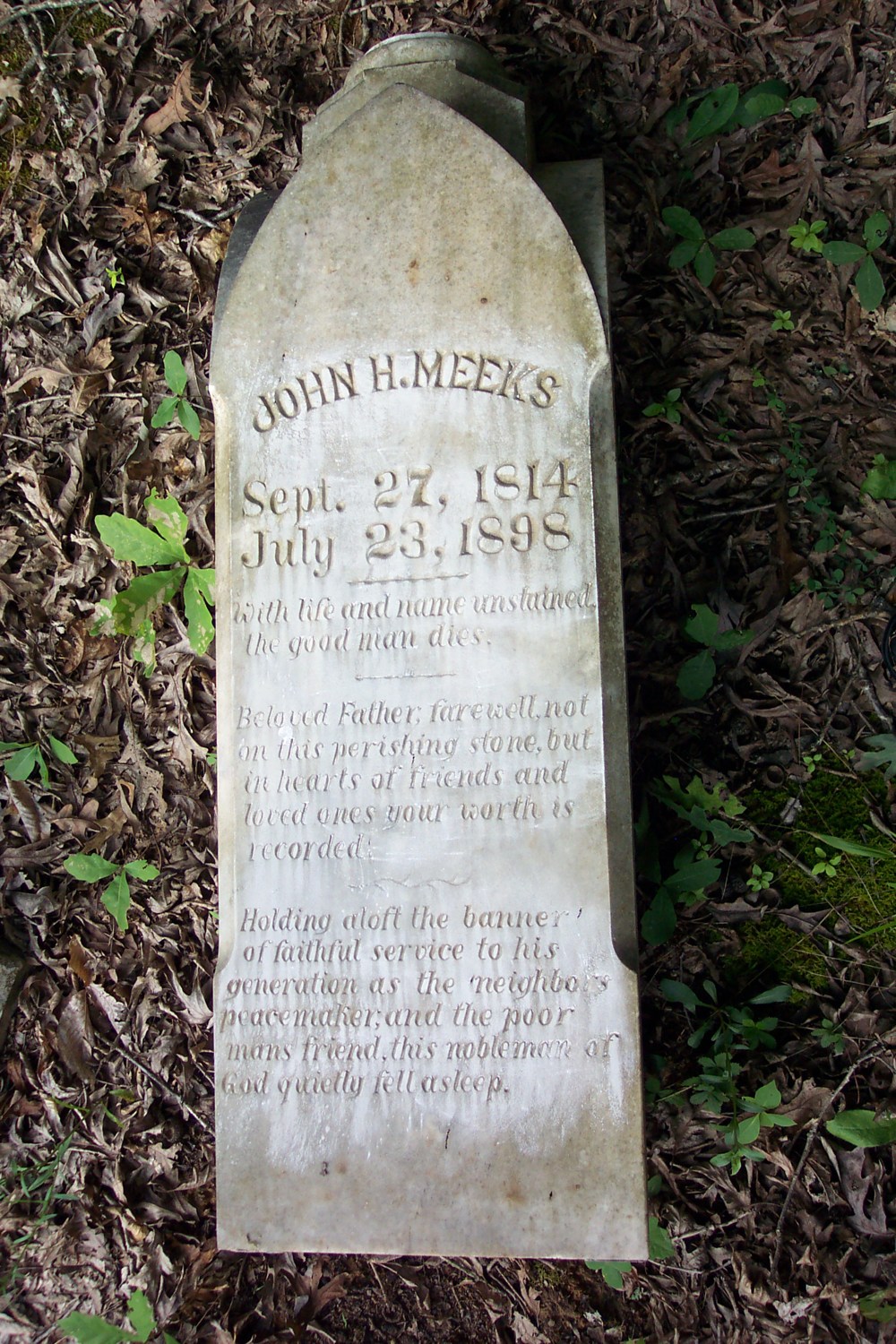
John H. Meeks
September 27, 1814
July 23, 1898
With life and name unstathed
the good man dies.
Beloved father; farewell, not
on this perishing stone, but
in hearts of friends and
loved ones your worth is
recorded.
Holding aloft the banner
of faithful service to his
generation as the neighbors
peacemaker; and the poor
man's friend, this nobleman of
God quietly fell asleep.
George L. Meeks
Son of R.P. & Mollie L. Meeks
The Severed Link
ON the united heart wall of my kind husband and myself was placed a chain of three strong links. A mysterious messenger visited us; we called him "Death." He removed the first link, leaving a broken chain and bleeding hearts. A social little band were we, and very happy. Perhaps we were too happy in our surroundings, and needed that some of our hearts' tendrils be torn from earth by having a support around which they were entwined removed to a fairer clime.
Almost in the same moment we think of George Larimore Meeks as a helpless infant; then a fair-faced, brown-eyed baby boy, tottering around our knees, with dark ringlets hanging over his brow; then from four to six years old, singing a score of songs and acting temperance pieces; then as a little schoolboy, merrily on his way, with book satchel across his shoulder; next, at the age of eleven, lovingly and manfully yielding obedience to his Lord; next, as a hopeful youth of seventeen, delivering his graduating "final" on the subject he had selected years before, "What I Have Written I Have Written;" next, we think of him at Kentucky University, associated with brainy men of national renown. In one of his letters from there, in alluding to his aged grandparents, he said: "The wheels of time have turned so smoothly with us for so long we need not expect it to remain thus much longer. There will necessarily be a change before a great while, but we cannot know who nor when." Little did he think he would be the first to make the change, and that so soon. We were permitted to give him a welcome home greeting, and his prospects for long life seemed unusually flattering; but—alas!—in less than a year what a change!
Almost seven years ago! Yet the intervening space seems so short—it must have been yesterday. The May skies were fair indeed without, and for a long time love's sunlight made it bright within. Almost seven years ago! Silent darkness had for hours brooded over our native land; all without was quiet and serene; all within was calm and still, except the anxious heart throbs of loving friends bending over a sinking form. We had often gone in secret to a throne of grace and earnestly pleaded: "Lord, "if it be possible, let this cup pass from me [us]: nevertheless [help us to say] not as I [we] will, but as thou wilt.'Help us to humbly pray: "Thy will be done." We watched our boy's calm countenance, unaffected by all his suffering and by our manifestations of grief; we gave ear to his dying songs, so soft and sweet, as if sung for only angels to hear. Moments and hours steadily passed, we knew not how. We glanced at the window. The sun's cheering rays were climbing from behind the eastern hills as an encouraging signal that day would soon be here in all its brightness, but to the anxious little group his messages failed to give the usual cheer. As the golden beams brightened nature, having bidden darkness depart, the deep shadows lengthened and darkened on our hearts; for we saw too plainly that the object we were so tenderly, lovingly watching was sinking, sinking—was fading away. "Papa, what time is it?" he asked. "Fifteen minutes after six, my son," softly replied the grieved father. Beads of cold perspiration were standing like dewdrops of pearl on that tall, full forehead; we heard the repeated "Mamma, don't cry—I'm not suffering one bit;" his lips were forbidden utterance; his eyes ceased to turn and behold the familiar faces surrounding him; his eyelids became still in death; his pulse had almost ceased; and, like a candle burning low, we at times would think the light was extinguished; then it would shine forth again, then go out. Not a sigh, not a murmur, not a tremor, not a groan, not a frown; and by the time the darkness of night had entirely retreated and the day king was fully established on the throne, the feeble glimmer of earth life had forsaken our boy, and a pall of darkness overshadowed our hearts. Our family chain was broken; there was a missing link. Our hearts were full; scalding tears would unbidden flow. It had never seemed to us that George would die so young; he had always been so strong, so hardy, so buoyant with hope, so full of life and ambition. Our selfish natures had told us we had not one child to spare; but the same divine finger that pointed to the hour hand of his earth life and marked its limit, pointed also to the eternal gates of glory ajar. The Lord gave; it is his privilege to take away, our duty to humbly submit. We must "wait, meekly wait, and murmur not." Our boy had much pleasure in his short life and missed life's sorrows.
On his last birthday (when nineteen), he, of his own accord, wrote some resolutions beautifully covering the entire ground of morality and Christianity. Relative to these resolutions, his uncle, M. H. Meeks, wrote as follows: "They are a remarkable production. No one but George could have gotten them up. There is a nobility of character in them, plainly visible, rarely to be seen. His memory is so sacred and touching to me. I loved him so much, so much. I cannot picture a heaven for me without him. You know my attachment for him was always singularly great." George had always manifested a fondness for home that was charming, especially for his own upper room. When at home, he could scarcely be induced to sleep in any other; said this room was the "spot on earth" he loved best. Though then made so bright and cheerful by the sunshine of his presence, it and many of its furnishings now only remind us that he once was there. His trunk still contains many relics he so highly prized—keepsakes he regarded as almost sacred. In his bookcase are the books marking his extensive course of study; there is his bed, unoccupied; there, by the door, is the same brick bearing his initials, "G. L. M;" on the mantel is a mirror he neatly framed, and a picture of our home, with the little family group, he one of the number. But there is a cold stillness in that room, and the passing breezes without seem to catch the impulse of a maternal heart and sadly repeat: "The loved occupant is gone, gone!" His familiar footfalls have forsaken the stairway; we miss him from his accustomed seat at the dining table and around the family hearthstone; we miss his cheerful companionship, his merry laugh, and his musical touch on the piano keys. His unusual fondness for music had developed a decided talent for the same, and during the last year or two he composed many beautiful little instrumental airs, among them "Variations of Happy Day "—the first song he ever sung. Two or three times during the first week of his illness he slipped out of bed and into the parlor to the piano, and played with remarkable sweetness. One of the last songs he sung and played was "A Boy's Best Friend is His Mother." Now, when we assemble in the parlor to hear music made by our children, one of our little home band is sadly missing—no George there now to play with his devoted sister those beautiful duets; no George to aid in the music, to which his very fingers and breath seemed tuned. He had looked forward with much anxiety to the time when he should be "twenty-one;" had planned great achievements, and thought it would be a wonderful thing to be a MAN.
He always had an eye for the beautiful, and was a great lover of nature. He called flowers "babies" before old enough to speak their names. During his sickness kind friends tenderly remembered him with floral tributes, for which he never failed to express his appreciation; and when laid in his coffin, hands of love gently and gracefully placed therein a modest wreath about his head and left many beautiful garlands to fade and wither on his grave. Do we miss him? We sadly miss him; but there is a sweetness connected with his memory we would not willingly lose, brightened by the assurance that as a Christian he was faithful to his trust.
The great calendar has made seven circuits, but I still often imagine he is only off on a visit, soon to return; and when something seems to whisper to me, "George is dead!" a strange kind of chill creeps over me, and I feel like my heart will sink. During the three weeks of his serious illness (typhoid fever), I scarcely lost consciousness in sleep. When I would close my eyes and try to relieve my mind of maternal anxiety, I would imagine I was rubbing the hands and arms of my poor, sick boy or preparing his medicine, when the sweet cadence of his plaintive, manly voice, trembling from weakness, would reach my ears, saying: "Mamma!" All inclination to sleep would instantly depart, and the next moment would find me at his side. Those three weeks still seem to me like a dream; the departure of our child, like a frightful nightmare.
Life itself is somewhat like a dream—eternity, the great awakening; and—O!—when this dream life is over and the angel's trump shall arouse the sleeping millions, only imagine what a glad awakening, and "what a gathering of the faithful that will be!"
-Molley Larimore Meeks, Hearthstone Echoes, pages 360-366.
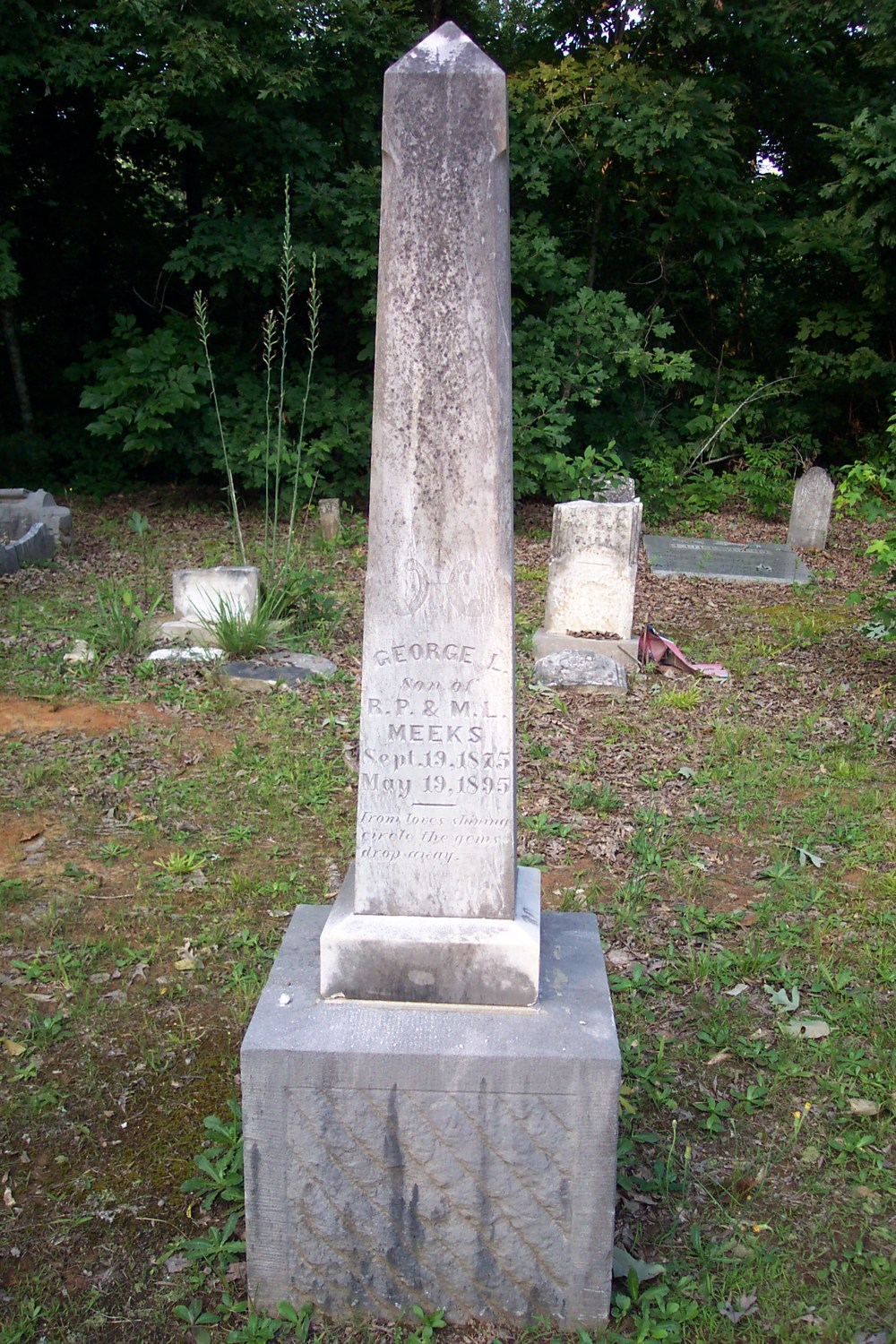
George L.
Son of
R.P. & M.L.
Meeks
September 19, 1875
May 19, 1895
From loves shining
circle the gems
drop away.
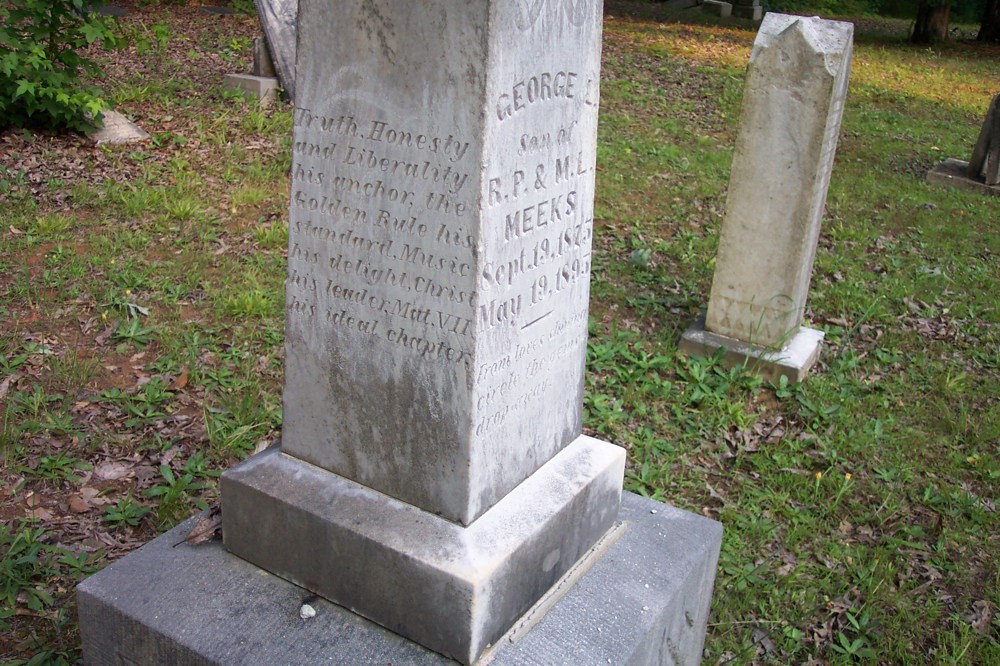
Truth, Honesty
and Liberality
his anchor, the
Golden Rule his
standard. Music
his delight. Christ
his leader. Matthew VII
his ideal chapter.
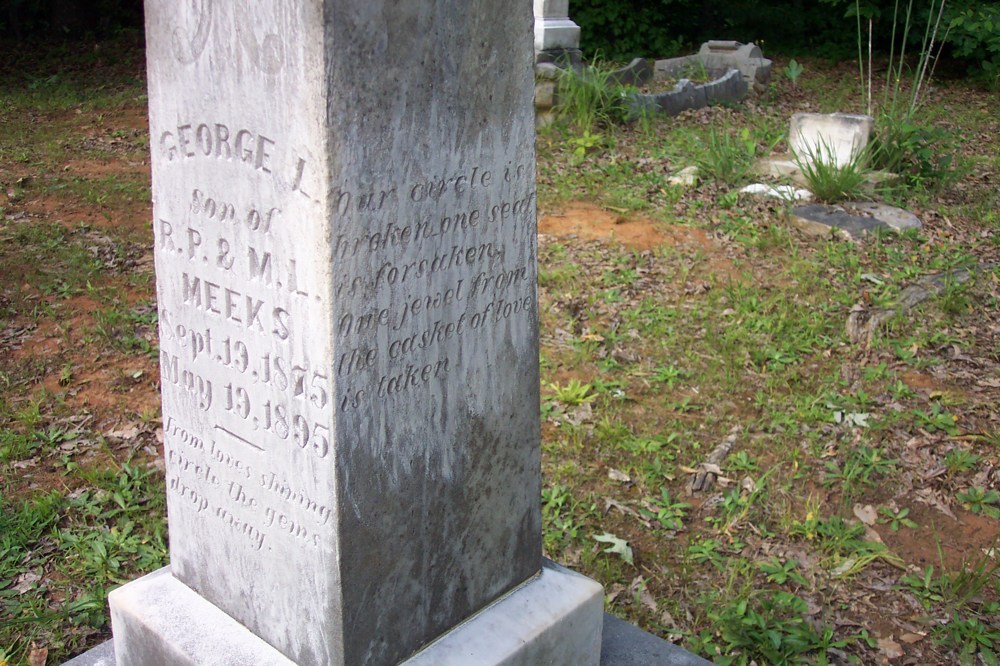
Our circle is
broken, one seat
is forsaken.
One jewel from
the casket of love
is taken
George L. Meeks, son of R.P. & Mollie Larimore
Meeks - 1875-1895
Others Buried At Clear Creek Cemetery
Robert Washington Michie
Early minister of
Clear Creek Church of Christ
1816-1902
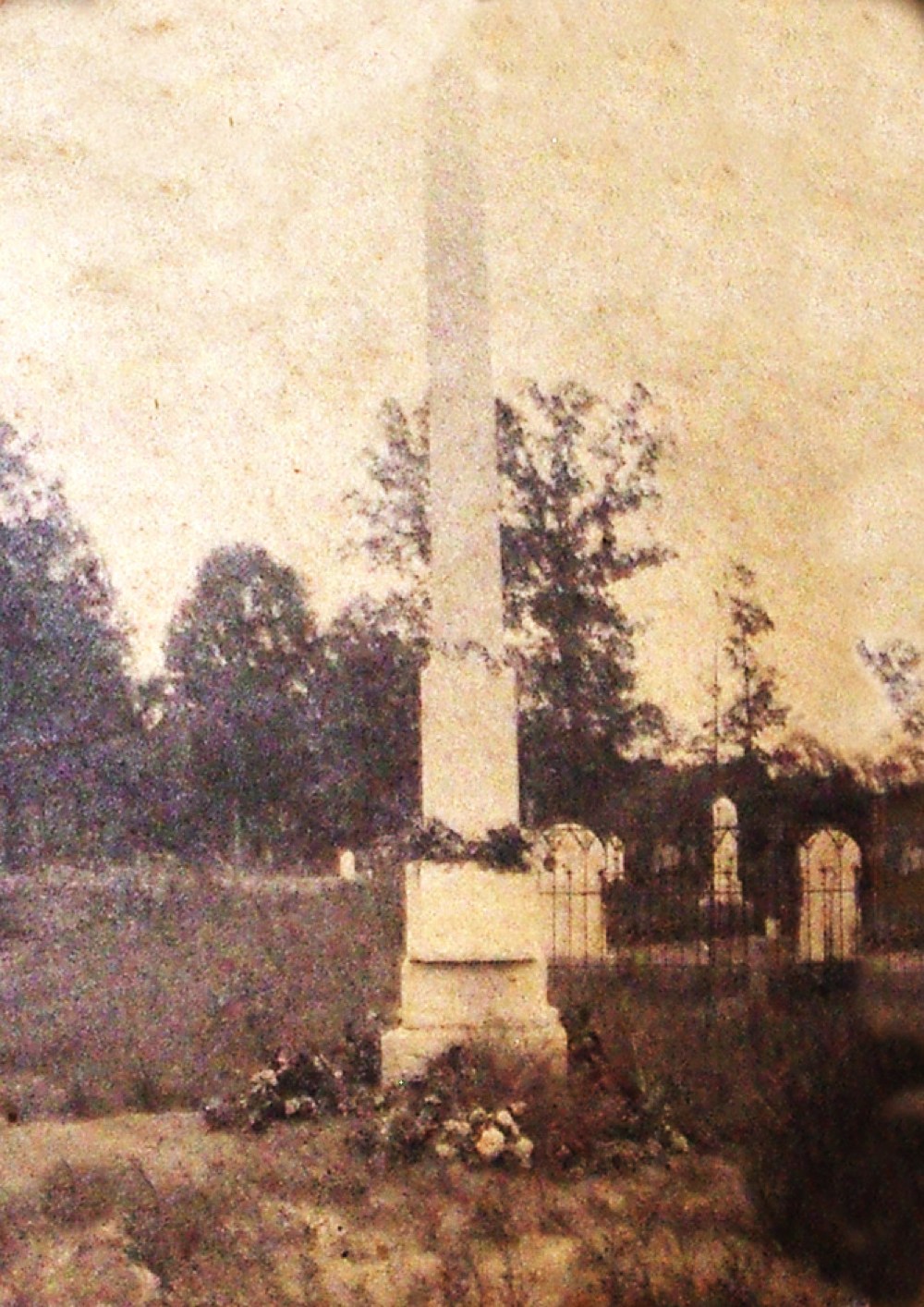
Early photo of the R.W. Michie's Grave
Courtesy of C. Wayne Kilpatrick, March, 2014
Brother
R.W. Michie
Born
April 26, 1816
Died
October 21, 1902
A brave man who lived
a glorious life in his
savior's cause.
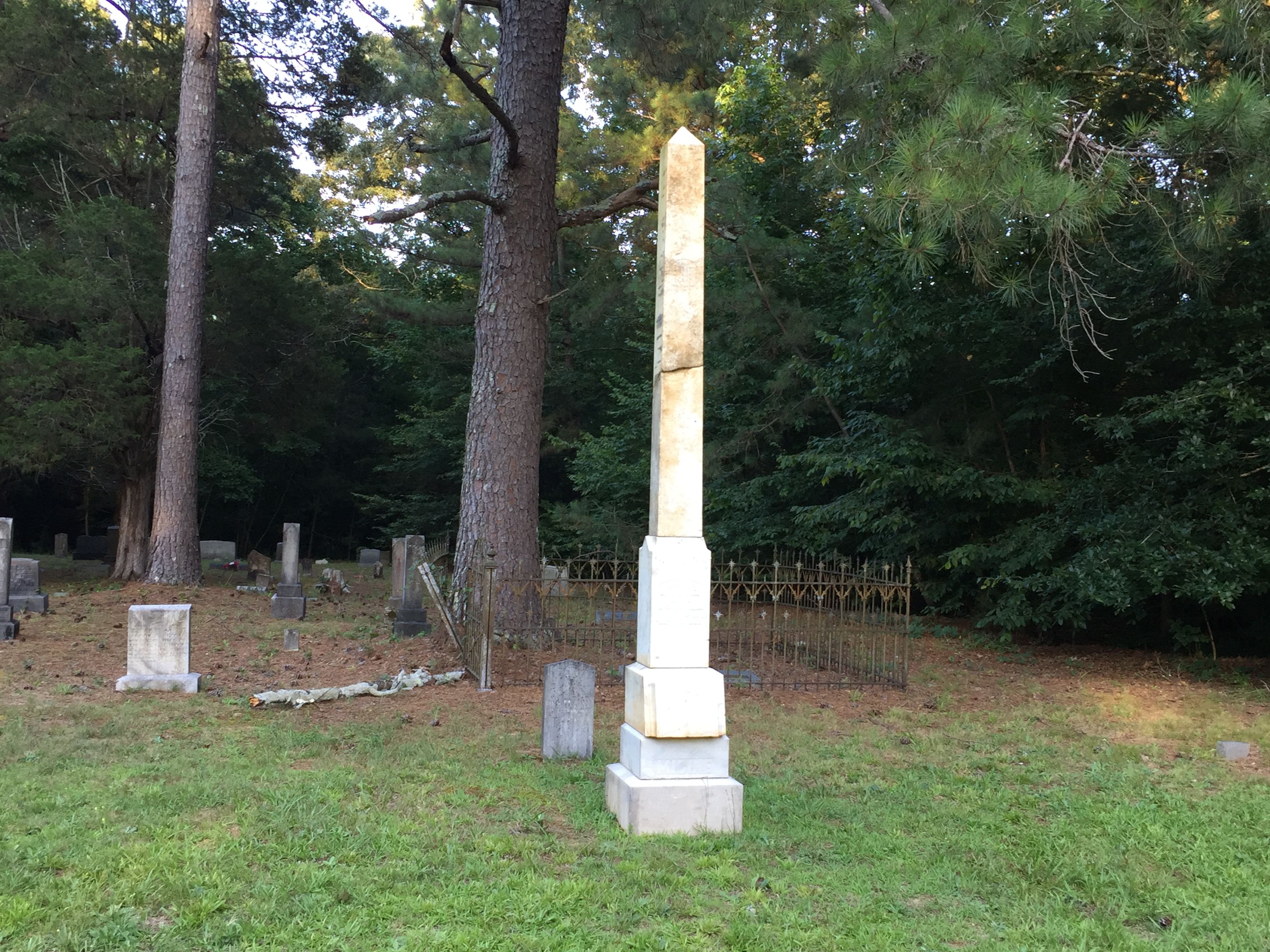
Photo by Tom L. Childers - Find-A-Grave
Jane, Wife of William Usserry
William Usserry was a minister of the gospel. It is assumed that he may be buried next to his wife, but no marker is extant.
Jane
Wife of
Wm. Usserry
Born
December 22, 1792
Died
October 15, 1850
Directions To Clear Creek Cemetery
GPS Location 35.160899,-88.406495
From Selmer, Tennessee: Go south on Hwy 45 just south of the bypass and turn left on Hwy. 142. toward Stantonville. Go 8.5 miles to Stantonville to yellow caution light (cross 224). Go 7/10 mile just past Bob's Salvage and turn left on Mt. Vinson Rd. Go to the first right (Dennie Barber Rd.). Go less than 1/4 mile and turn left on Clearcreek Cemetery Rd. Go to the Cemetery. Graves are in the rear.
From Shiloh State Park, Shiloh, Tennessee: From Shiloh Park go west on Hwy 142 toward Stantonville 2.5 miles to city limits the 7/10 mile to right on Mt. Vinson Rd. To the first right (Dennie Barber Rd.) Go less than 1/4 mile and turn left on Clearcreek Cemetery Rd. Go to the Cemetery. Graves are in the rear.
Acknowledgements:
Special thanks extended to C. Wayne Kilpatrick for getting information on the early buildings and history of the Clear Creek church made available on this site. Your web editor has visited this location several times. In this cemetery lies the remains of the esteemed mother of T.B. Larimore and his sister Mollie Larimore Meeks. Also buried here is the son of R.P. & M.L. Meeks, George. Also the parents of R.P. Meeks, General John H. & Mrs. Eleanor Adkins Meeks.
![]()
